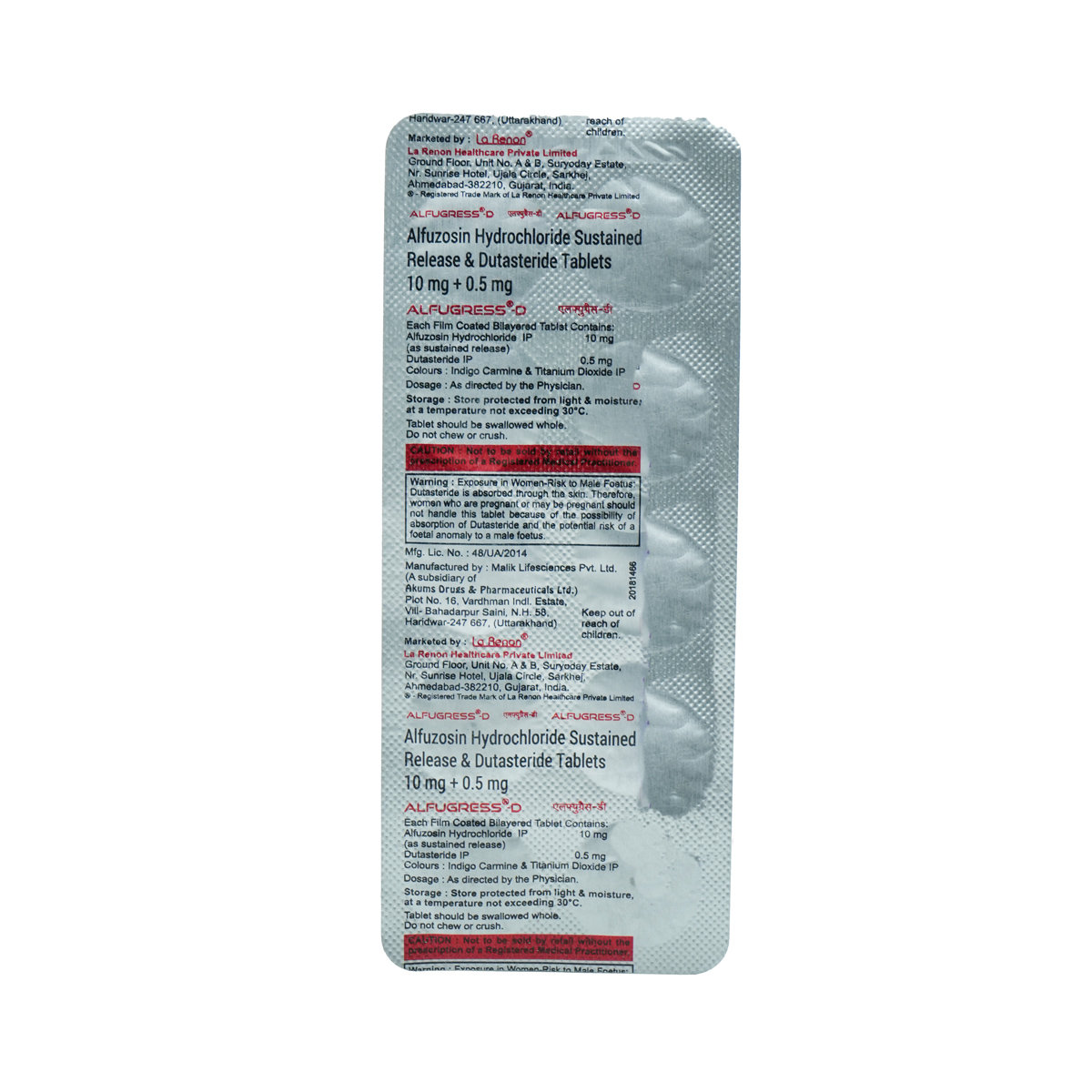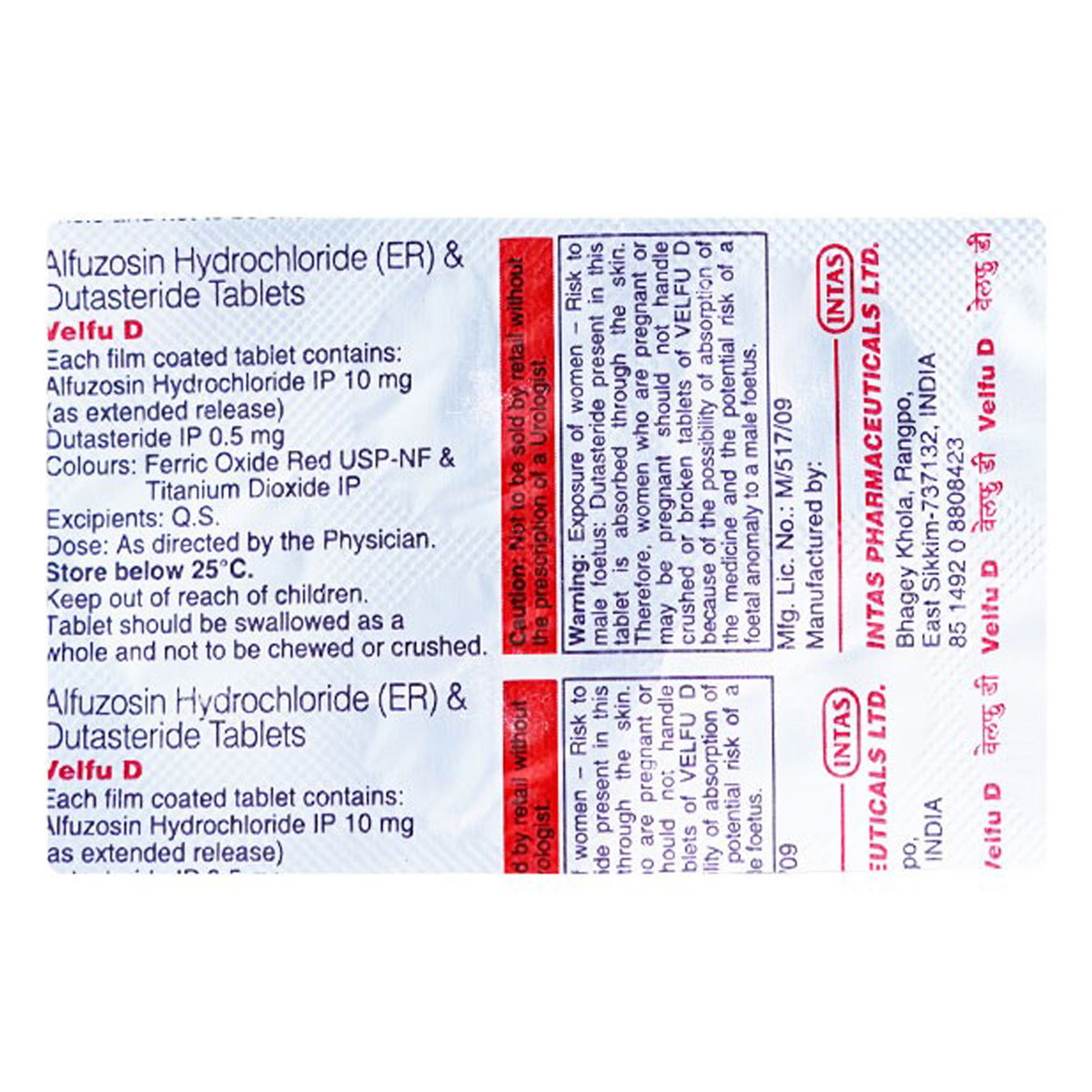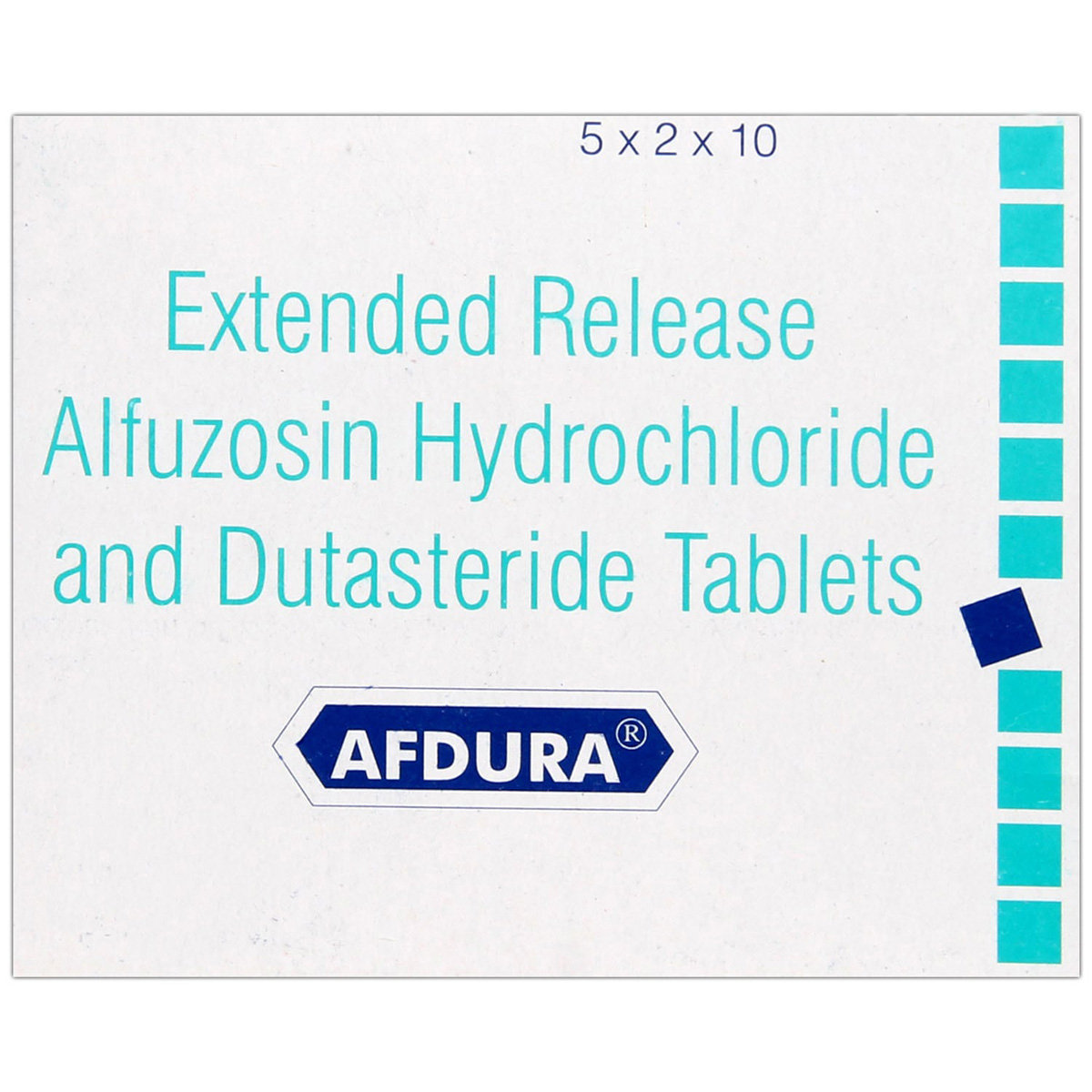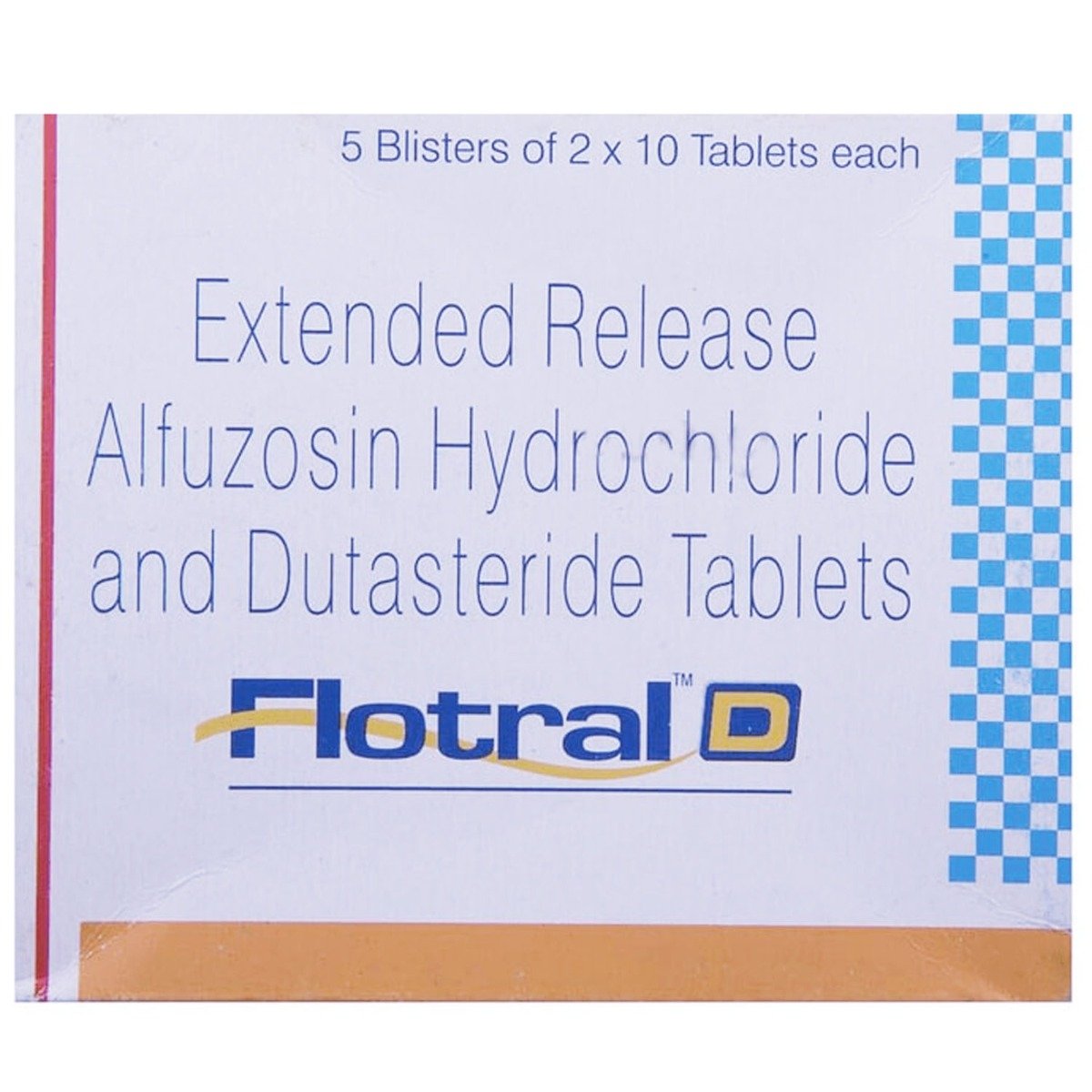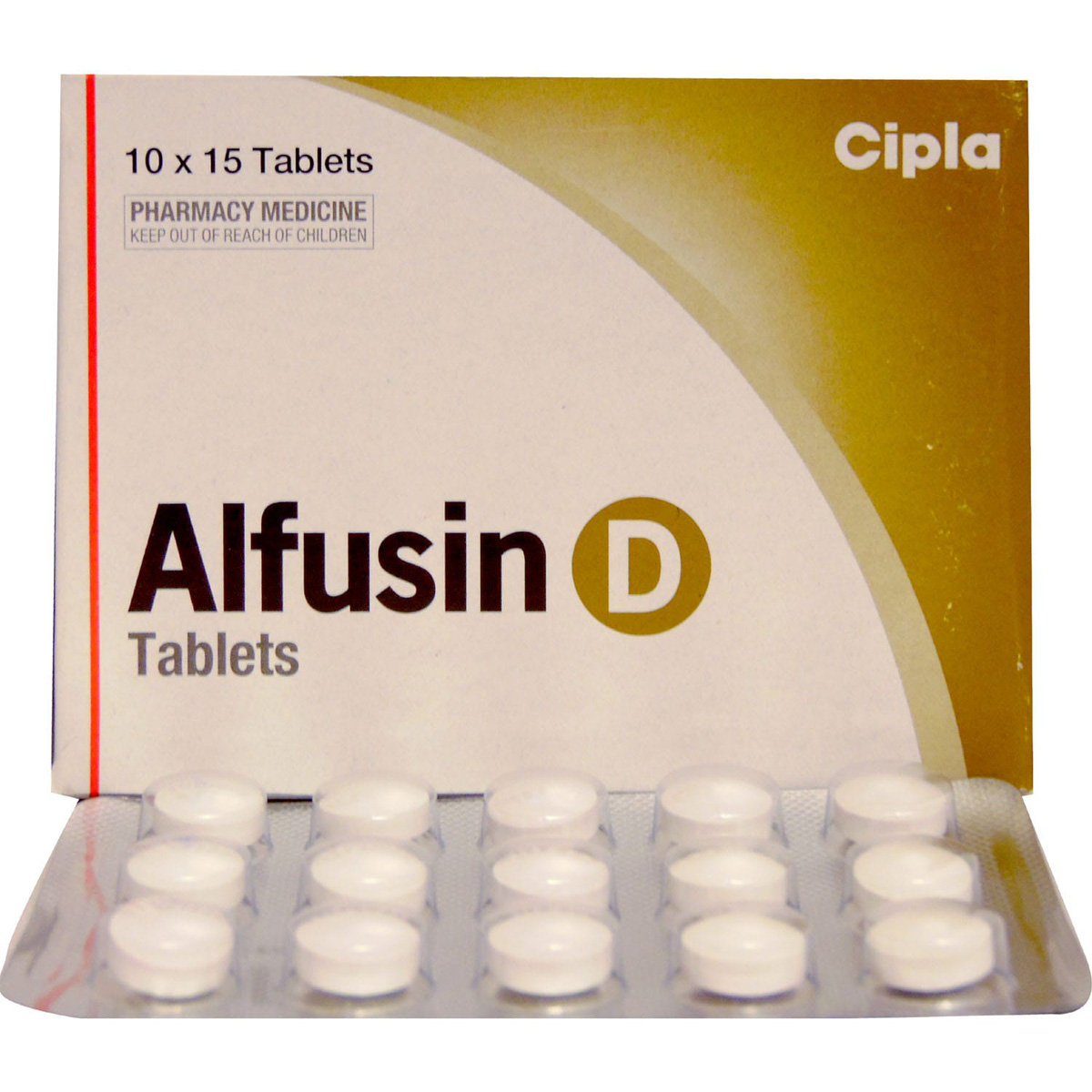Aldocin-D Tablet


MRP ₹198
(Inclusive of all Taxes)
₹29.7 Cashback (15%)
Provide Delivery Location
Online payment accepted
 Prescription drug
Prescription drugWhats That
Composition :
Manufacturer/Marketer :
Consume Type :
Return Policy :
About Aldocin-D Tablet
Aldocin-D Tablet belongs to a group of medicines known as 'urinary bladder relaxant' medication, used primarily in treating the enlarged prostate gland. Benign prostatic hyperplasia (enlarged prostate gland) is a non-cancerous growth of the prostate gland caused due to overproduction of a dihydrotestosterone hormone in men. As the gland enlarges, it can lead to urinary problems, such as difficulty passing urine and frequent urination. Aldocin-D Tablet helps in getting relief from these symptoms. Aldocin-D Tablet does not cure prostate cancer.
Aldocin-D Tablet contains Alfuzosin (alpha-blockers) and Dutasteride (5-alpha reductase inhibitor), primarily used to treat the enlarged prostate gland. Alfuzosin makes it easy to pass urine by relaxing the prostate gland muscles. Dutasteride reduces the enlarged prostate gland's size by lowering the production of dihydrotestosterone hormone, thereby relieving urinary incontinence symptoms that minimise the need for prostate surgery and the risk of acute urinary retention. Both of them collectively improve Benign Hyperplasia Prostate symptoms (BPH).
You are advised to take Aldocin-D Tablet for as long as your doctor has prescribed it for you, depending upon your medical condition. The most common side effects of Aldocin-D Tablet are dizziness, lightheadedness, drowsiness, sexual problems (decreased sex drive or libido), runny/stuffy nose, reduced amount of semen/sperm, testicle pain/swelling, increased breast size, or breast tenderness. Most of these side effects do not require medical attention and gradually resolve over time. However, if the side effects are persistent, reach out to your doctor.
Women or children should not take Aldocin-D Tablet. Please inform your doctor before starting Aldocin-D Tablet if you have low blood pressure, liver/kidney disease, or history of heart problems. It is advisable to use contraceptives (like a condom) while having sex if your wife is pregnant as Aldocin-D Tablet is known to pass in semen. Do not donate blood while taking Aldocin-D Tablet. However, you can donate it six months after the last dose of Aldocin-D Tablet.
Uses of Aldocin-D Tablet
Directions for Use
Key Benefits
Aldocin-D Tablet contains Alfuzosin (alpha-blockers) and dutasteride (5-alpha reductase inhibitor), primarily used in treating the enlarged prostate gland. As the gland enlarges, it can lead to urinary problems, such as difficulty passing urine and a frequent urination urge. Dutasteride lowers the production of dihydrotestosterone hormone, which leads to a decrease in the size of the prostate and, as a result, relieves the symptoms. This will reduce the risk of acute urinary retention and the need for surgery. Alfuzosin makes it easy to pass urine by relaxing the muscles of the gland. Both of them collectively improve Benign Hyperplasia Prostate symptoms (BPH).
Storage
- Inform your doctor about dizziness symptoms. They may adjust your medication regimen or prescribe additional medications to manage symptoms.
- Follow your doctor's instructions for taking medication, and take it at the same time every day to minimize dizziness.
- When standing up, do so slowly and carefully to avoid sudden dizziness.
- Avoid making sudden movements, such as turning or bending quickly, which can exacerbate dizziness.
- Drink plenty of water throughout the day to stay hydrated and help alleviate dizziness symptoms.
- If you're feeling dizzy, sit or lie down and rest until the dizziness passes.
- Track when dizziness occurs and any factors that may trigger it, and share this information with your doctor to help manage symptoms.
- Hydrate your body: Drink enough water to prevent dehydration and headaches.
- Calm Your Mind: Deep breathing and meditation can help you relax and relieve stress.
- Rest and Recharge: Sleep for 7-8 hours to reduce headache triggers.
- Take rest: lie down in a quiet, dark environment.
- Cold or warm compresses can help reduce tension.
- Stay Upright: Maintain good posture to keep symptoms from getting worse.
- To treat headaches naturally, try acupuncture or massage therapy.
- Over-the-counter pain relievers include acetaminophen and ibuprofen.
- Prescription Assistance: Speak with your doctor about more substantial drug alternatives.
- Severe Headaches: Seek emergency medical assistance for sudden, severe headaches.
- Frequent Headaches: If you get reoccurring headaches, consult your doctor.
- Headaches with Symptoms: Seek medical attention if your headaches include fever, disorientation, or weakness.
- Rest well; get enough sleep.
- Eat a balanced diet and drink enough water.
- Manage stress with yoga and meditation.
- Limit alcohol and caffeine.
- Physical activities like walking or jogging might help boost energy and make you feel less tired.
- Inform your doctor about the symptoms you're experiencing due to medication.
- Your doctor may adjust your treatment plan, which could include changing your medication, adding new medications, or offering advice on managing your symptoms.
- Practice good hygiene, including frequent handwashing, avoiding close contact with others, and avoiding sharing utensils or personal items.
- Stay hydrated by drinking plenty of fluids to help loosen and clear mucus from your nose, throat, and airways.
- Get plenty of rest and engage in stress-reducing activities to help your body recover. If your symptoms don't subside or worsen, consult your doctor for further guidance.
- If you experience symptoms like coughing, wheezing, chest tightness, or difficulty breathing after taking medication, seek medical attention immediately.
- Your healthcare provider will work with you to stop the medication causing the reaction, start alternative treatments, and provide supportive therapy.
- To manage symptoms and prevent complications, follow your doctor's advice to use inhalers or nebulizers as prescribed, practice good hygiene, avoid irritants, stay hydrated, and get plenty of rest.
- Regularly track your symptoms and report any changes or concerns to your healthcare provider.
- Drink warm fluids such as warm water with honey, broth, soup or herbal tea to soothe sore throat.
- Gargle with warm salt water.
- Suck on lozenges to increase the production of saliva and soothe your throat.
- Use a humidifier to soothe sore throat as it adds moisture to the air and makes breathing easier.
- Do not stand up suddenly. Lie down and get up slowly only when you feel better.
- Avoid alcohol and large meals.
- Drink enough water before standing for long periods.
- Exercise regularly; however, avoid exercising in extreme heat.
- Eat small, low-carb meals.
- Wear compression stockings.
Drug Warnings
Do not take Aldocin-D Tablet if you are allergic to any of its ingredients. Aldocin-D Tablet should not be taken if you have low blood pressure, which makes you feel dizzy, lightheaded, or faint, or if you have glaucoma. Inform your doctor if you have a history of heart disease or liver/kidney disease. Before undergoing surgery (cataract), please consult a doctor as you might be advised to stop Aldocin-D Tablet. During sexual intercourse, use a condom as Aldocin-D Tablet is found in semen. Contact your doctor for advice if you are pregnant or plan to get pregnant before taking Aldocin-D Tablet as it may affect the development of male genitals. Also, keep your doctor informed about all the OTC medicines you use. Patients taking Aldocin-D Tablet should be cautioned about driving, operating machinery, or performing hazardous tasks, as it can cause drowsiness or dizziness. In rare cases, problems of penis erection, ejaculation, and pain in the penis can occur. So if these symptoms last for a longer time, immediately contact your doctor.
Drug-Drug Interactions
Drug-Drug Interactions
Login/Sign Up
When Aldocin-D Tablet and Tipranavir are taken together, the body's ability to break down Aldocin-D Tablet may be reduced. This increases the risk and severity of side effects.
How to manage the interaction:
Taking Aldocin-D Tablet with Tipranavir is not recommended as it can possibly result in an interaction. It should be taken only when advised by a doctor. However, if you experience symptoms like severe dizziness, fainting, fast/irregular heartbeat, chest pain, fast or irregular heartbeat, nausea, or sweating contact a doctor immediately. Do not discontinue any medications without consulting a doctor.
Taking Aldocin-D Tablet with halofantrine can increase the risk or severity of irregular heart rhythms. The risk increases in patients with a history of heart illness or electrolyte imbalance.
How to manage the interaction:
Taking Aldocin-D Tablet and halofantrine together is generally avoided as it can result in an interaction. It can be taken if your doctor has advised it. However, if you experience sudden dizziness, lightheadedness, fainting, shortness of breath, chest pain or tightness, or a rapid heartbeat, contact your doctor immediately. Do not discontinue any medications without consulting a doctor.
Taking Telaprevir with Aldocin-D Tablet can increase the blood levels and effects of Aldocin-D Tablet. This can increase the risk or severity of low blood pressure.
How to manage the interaction:
Taking Telaprevir with Aldocin-D Tablet is not recommended as it can possibly result in an interaction, it can be taken only if your doctor has advised it. However, if you experience sudden dizziness, lightheadedness, fainting, shortness of breath, chest pain or tightness, rapid heartbeat, or memory loss, contact your doctor immediately. Do not discontinue any medications without consulting a doctor.
When Aldocin-D Tablet and Clarithromycin can increase the risk or severity of side effects like low blood pressure or irregular heart rates.
How to manage the interaction:
Taking clarithromycin with Aldocin-D Tablet is not recommended as it can result in an interaction; it should be taken only if your doctor has advised it. However, if you experience dizziness, headache, palpitations, or chest discomfort, contact your doctor immediately. Do not discontinue any medications without consulting a doctor.
Using Aldocin-D Tablet together with voriconazole may significantly increase the blood levels and effects of Aldocin-D Tablet.
How to manage the interaction:
Taking Voriconazole with Aldocin-D Tablet is not recommended, please consult a doctor before taking it. Call a doctor if you experience dizziness, headache, nasal congestion, or heart palpitation. Do not stop using any medications without talking to a doctor.
Taking Aldocin-D Tablet with Thioridazine can increase the risk or severity of irregular heart rhythms. The risk increases in patients with a history of heart illness or electrolyte imbalance.
How to manage the interaction:
Taking Aldocin-D Tablet with Thioridazine together can possibly result in an interaction, it can be taken if your doctor has advised it. However, if you experience sudden dizziness, lightheadedness, fainting, shortness of breath, chest pain or tightness, rapid heartbeat, or memory loss, contact a doctor immediately. Do not discontinue any medications without consulting a doctor.
When Idelalisib is taken with Aldocin-D Tablet, it can lower the metabolism of Aldocin-D Tablet. This can increase the risk or severity of side effects like low blood pressure.
How to manage the interaction:
Taking Aldocin-D Tablet with Idelalisib is not recommended as it can possibly result in an interaction, it should be taken only if your doctor has advised it. However, if you experience dizziness, lightheadedness, fainting, headache, flushing, nasal congestion, heart palpitation, and priapism (prolonged and painful erection), contact your doctor immediately. Do not discontinue any medications without consulting a doctor.
Concomitant use of Aldocin-D Tablet with Atazanavir can increase the risk of low blood pressure.
How to manage the interaction:
Coadministration of Aldocin-D Tablet with Atazanavir is not recommended, however, it can be taken if your doctor has advised it. Contact your doctor immediately if you experience dizziness, palpitations, difficulty swallowing, or sweating. It is recommended to monitor your blood pressure regularly. Do not discontinue any medications without first consulting your doctor.
Coadministration of Dronedarone with Aldocin-D Tablet can increase the risk or severity of irregular heart rhythms. The risk increases in patients with a history of heart illness or electrolyte imbalance.
How to manage the interaction:
Taking Dronedarone with Aldocin-D Tablet together is not recommended, as it leads to an interaction, it can be taken if your doctor has advised it. However, if you experience dizziness, shortness of breath, chest discomfort, or palpitations, contact your doctor immediately. Do not discontinue any medications without consulting a doctor.
Coadministration of Aldocin-D Tablet and ceritinib can increase the risk of developing side effects.
How to manage the interaction:
Taking Ceritinib with Aldocin-D Tablet is not recommended as it can result in an interaction; it should be taken only if your doctor has advised it. However, if you experience dizziness, headache, palpitations, contact your doctor immediately. Do not discontinue any medications without consulting a doctor.
Drug-Food Interactions
Drug-Food Interactions
Login/Sign Up
Diet & Lifestyle Advise
- Avoid drinking alcohol, caffeine, and fizzy drink. Limit intake of artificial sweeteners.
- Maintain a healthy lifestyle and exercise regularly, so you do not feel heavy in the abdomen.
- Also, drink less water in the evening and before sleeping to have a sound sleep and not wake up frequently for urination.
- Any medication that may worsen urinary symptoms (for cold and cough) should be avoided.
Side Effects of Aldocin-D Tablet
- Impotence (not able to achieve or maintain an erection)
- Decreased sex drive (libido)
- Difficulty with ejaculation
- Gynecomastia (breast enlargement or tenderness)
- Dizziness
- Breast tenderness
- Problems with ejaculation
Habit Forming
Therapeutic Class
All Substitutes & Brand Comparisons
RX
Out of StockAlfanage 10mg/0.5mg Tablet
Allenge India Pharma
₹170
(₹15.3 per unit)
14% CHEAPERRX
Out of StockAlfufast D 10mg/0.5mg Tablet
Leeford Healthcare Ltd
₹175
(₹15.75 per unit)
11% CHEAPERRX
Out of StockAlfuprost D 10mg/0.5mg Tablet
Future Pharma Pvt Ltd
₹180
(₹16.2 per unit)
9% CHEAPER
Product Substitutes
Drug-Diseases Interactions
Drug-Diseases Interactions
Login/Sign Up
FAQs
Drug-Drug Interactions Checker List
- INDOMETHACIN
- ERYTHROMYCIN
- DICLOFENAC
- IBUPROFEN
- PAROXETINE
- VARDENAFIL
- WARFARIN
- INDINAVIR
- DILTIAZEM
- FLUOXETINE
- RITONAVIR
- VERAMAPIL
- SILDENAFIL
- TADALAFIL
Special Advise
- Consult your doctor immediately if you have symptoms such as shortness of breath, extreme tiredness, and swelling in your ankles and legs.
- Aldocin-D Tablet is not intended as an antihypertensive (blood pressure lowering) drug.
- Don't stand suddenly from a lying or resting position, which may increase the risk of falls.
Disease/Condition Glossary
Benign prostatic hyperplasia (BPH): The enlargement of the prostate gland is Benign prostatic hyperplasia. It is a non-cancerous growth of the prostate gland caused due to overproduction of dihydrotestosterone hormone in men. If not treated, it may lead to the formation of bladder stones, infection, and reduced kidney function. BPH usually occurs in males above 50 years of age.

Have a query?
Alcohol
Safe if prescribed
Aldocin-D Tablet should not be taken until prescribed if you are taking alcohol. Keep your doctor informed if you drink alcohol.
Pregnancy
Consult your doctor
As the data on the use of Aldocin-D Tablet in pregnant women is limited, the use of Aldocin-D Tablet in pregnancy is restricted. It is highly recommended to consult your doctor before taking this drug in case you are pregnant.
Breast Feeding
Consult your doctor
As the data on the use of Aldocin-D Tablet in breastfeeding women is limited, the use of Aldocin-D Tablet is restricted. It is highly recommended to consult your doctor before taking this drug in case you are breastfeeding.
Driving
Safe if prescribed
Aldocin-D Tablet can make some people feel dizzy, which may affect your ability to drive or operate machinery safely.
Liver
Consult your doctor
Aldocin-D Tablet should not be taken until prescribed. Regular monitoring of liver function tests is recommended.
Kidney
Consult your doctor
Aldocin-D Tablet should not be taken until prescribed. Regular monitoring of kidney function tests is recommended.
Children
Safe if prescribed
Aldocin-D Tablet is not recommended for children. The safety and effectiveness of Aldocin-D Tablet have not been established in children due to limited testing of this drug on children by competent authorities worldwide.



